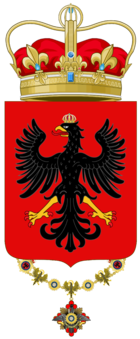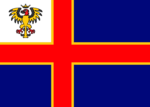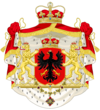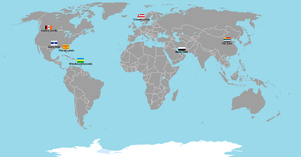Empire of Paravia
Paravia (/pɑːrɑːvɪɑː/), officially the Empire of Paravia (Norwegian: Keiserriket Paravia), is a self-declared sovereign state, not recognized by any member of the United Nations and therefore often referred to as a micronation. It is a unitary state, though it was formerly a federation consisting of four states, formerly independent micronations which joined the empire. The center aɑːnd oldest part of the Empire, the Paravian Crown Lands, is situated in Norway. However, Paravia claims more territory across the world in the United States, Grenada, China, and United Arab Emirates. The Empire consist of 11 provinces, 2 duchies, 1 grand duchy and 1 archduchy. Three provinces hold the designation High Imperial Provinces, there being the Empire's Former federal states, the Grémmian Empire, the State of Galveston, and the Kingdom of Viselander. It shares borders with the micronations Nedland, Abelden, and Esse.
The Province of Clyne is the largest province by area within the Paravian Crown Lands, and contains the Imperial capital, Nyros. Nyros is the residence of the Emperor and is the location of the Imperial regalia and the Crown Lands treasury. It is also the meeting place of the Imperial Council, which meets in the Council Room in the Imperial Palace.
After a few months of planning (between July and November 2014), Paravia was founded on the 29th November 2014 when Patrick I declared independence from Norway. Its current ruler Emperor Patrick I of the ruling house of Renvik is the first monarch to rule Paravia. The heir to the Imperial throne being the Emperor's younger brother Nicholas, the Prince Imperial.
History
Foundation Period
Paravia was founded on 29 November 2014 by Patrick Renvik, following a period of planning since July. After authoring a short Declaration of Independence (now lost), Patrick declared himself Emperor, and proceeded to annex the properties of his parents, grandparents and aunt. The day after independence, the Emperor appointed his father, Sean Renvik, as High Chancellor, the head of government. On the same day, Emperor Patrick joined the micronational community, announcing the foundation of Paravia on the Micronation.org forum. In the beginning of January 2015 the Codex Paravica was finished, and the Imperial Council met for the first time.
Post-Foundation Period
In the early months of 2015 Paravia grew slowly, annexing territories in the United States, and expanding bilateral diplomatic relations. On 31 May 2015, Paravia officially entered into an alliance with the Republic of South Maudlandia. The alliance entered Paravia into the highly controversial Pannonian War against Liberland. Patrick I announced Paravia's withdrawal from the war on 9 June, after heavy condemnation of the war from the international community. The withdrawal completed the following day.

Following the Pannonian War, the Paravian government and Patrick I adopted vehemently anti-war policies, and Paravia joined the Union Against Micronational War. About a month after the end of the war, the International of Left-wing Parties invited the government to join as a special non-party member. The government, especially the Emperor, were actively involved. Over the course the existence of the ILP, Paravia formed close relations with other micronations, including Nedland, Grémmia, Usi and Humanytaria.
In August 2015, following a coup in Nedland which overthrew president Ned Gunderson and eventually left Nedland without a government, Paravia annexed Nedland as an autonomous region on Gunderson's request, doubling the Empire's territorial size and population. In the following months, Paravia grew very rapidly, annexing 3 other autonomous regions: Dachenia, Skovaji and the New Woods Republic. In November 2015, Ned Gunderson suddenly left his position in Nedland, and the autonomous region of Nedland was dissolved at the beginning of December. The former Nedlandic territory of Šlovedkia, however, was re-annexed as a crown dependency in January 2016 on Gunderson's request.
In the first few days of 2016, the autonomous region of Skovaji declared independence, further reducing the size of the Empire. In February Paravia held its first general elections. The incumbent High Chancellor Sean Renvik, the Emperor's father, was replaced by Lise Naesheim-Renvik, the Emperor's mother, as High Chancellor. There was a period of general stability until May 2016, when the Crown dependency of Slovedkia, the last remnant of Nedland, declared independence as the short-lived Republic of Nedland, following the return of Ned Gunderson to the community. Emperor Patrick was recognized as emperor of Nedland one week later, thereby ending the Republic of Nedland and forming the State of Nedland.
By June, the Emperor and the Imperial Council had started questioning the status of the last two remaining autonomous regions, Dachenia and the New Woods Republic. Following negotiations between the Nedlandic and Paravian governments, Paravia granted Dachenia independence. Only five days later, the last autonomous region, the New Woods Republic, was dissolved following over half a year of total inactivity. This left Paravia with only the "core territories" (now known as the Crown Lands). Within half a year, the empire's population shrank from 103 to 36.
Federation
Treaty of Nyros
Through mid-July 2016, several newer states in the Micronational community began to criticize the international trend of many national legislatures consisting of the same people with multiple citizenships. The ensuing crisis, humorously described as the "Micronational existential crisis", led a number of younger micronationalists to temporarily leave the community, notably Anthony Clark. In response, the leaders of Paravia, Nedland, Grémmia and Cinnamon Creek (later also the leaders of Dachenia, Humanytaria and Usi) started negotiations to form a larger federation. The negotiations produced the Treaty of Nyros, by which all the signatory nations were annexed into Paravia as federal states, with the original territories of Paravia becoming the Crown Lands).
Constitutional development

After the Treaty of Nyros entered into force, the entire government structure changed dramatically: The previously unicameral legislature became bicameral, with the Imperial Council repurposed as the upper house of the new Riksting, whilst a newly-formed Chamber of Delegates, composed of one delegate from each federal state, became the lower house. The High Chancellor lost the position as head of government to the Riksminister, and became head of government of the Crown Lands.
A week after the treaty entered into force, Mikael Bokmann became interim Riksminister by unanimous consent of the Chamber of Delegates. Later in early August, the Chamber of Delegates and the Imperial Council both unanimously passed the Constitution Act, which codified the federal structure of the Empire and personal rights.
Early federal developments
The empire quickly descended into inactivity however, and the Chamber of Delegates held sessions few and far between. The State of Nedland, one of the founding states of the federation, used the inactivity as a justification to unilaterally secede, becoming the Khanate of Nedland. After initial outrage at the illegal move, the government of Nedland agreed to carry out a constitutional independence referendum. Nedlanders voted overwhelmingly for independence, and Nedland seceded.
A month later the Cinnamon Creek, another founding state, seceded by independence referendum and subsequently became a protectorate of the Imperial Grand Duchy of Lundenwic.
By the beginning of October the Kingdom of Viselander joined the Empire, yet inactivity continued. By mid-November activity slowly started returning, with a few sessions of the Chamber of Delegates taking place. On the 9th December 2016, Stephen Freayth, the king of Viselander, was elected by the Chamber of Delegates as Riksminister. The same day, the Empire annexed the State of Zelenarus. On 27 December the Chamber of Delegates approved the Constitution Addendum Act, which made provisions concerning citizenship of the various states, interstate commerce, and treaty ratification.
On February 12, 2017, the Dachenia illegally seceded from Paravia and sparked an international crisis by ceding Paravian land to the Empire of Pavlov. Following negotiations and mediation from the Secretariat for Conflict Resolution and Intermicronational Law of the GUM, Dachenia legally seceded from Paravia, and Paravia recognized Dachenian independence.
Federal collapse and reorganization
Throughout the latter half of 2017 the majority of Paravian federal states gradually seceded or were dissolved due to inactivity. As the number of active states declined, so did federal activity, with the federal legislature, the Riksting being unable to hold sessions for lack of active members. Following a failed attempt at integrating the Federal Empire of Aarbaro, a smaller and younger federal empire formed by previous Paravian states, activity declined to a minimum, with the remaining active members focusing activity elsewhere.
By January 2018 the federal government was in practice completely inactive. In a last-ditch effort to save the empire Emperor Patrick, in his capacity as federal head of state and with the support of Sebastekrator of the Grémmians and former Riksminister Mikael Bokmann, launched a self coup, dissolving the Riksting and suspending the constitution. The following days would see the Emperor issue decrees re-appointing Bokmann to the Riksministership, and dissolving the federal states, reconstituting them as High Imperial Provinces within the Empire. These decrees heralded the end of the Paravian federal system which had existed for one and a half years, reconstituting the empire as a unitary state.
Attempted resurrection
Following the self-coup and the reconstitution of a unitary state, the Emperor and Bokmann, in tandem with Stephen Freayth had some plans for the resurrection of Paravia through the new unitary model, with a stronger executive monarchy than that within the federal system to ensure the continued functioning of government even in low-activity periods. These attempts slowly tapered off after Bokmann’s effective resignation from the community.
Through later 2018 and early 2019 the Imperial Bank launched a few attempts at the minting of Reni coins, minting a total of 3 prototypes from tin.
Politics
Government

Paravia is a Unitary Constitutional monarchy, ruled by an Emperor. The Empire consists of 14 provinces, 3 of which hold the designation High Imperial Province. These High Imperial Provinces constitute the 3 former federal states of the Empire, retaining certain rights not held by the remaining 11 Provinces. Each province may pass certain internal laws, though their autonomy is limited. The provinces and territories of the Empire are divided into Viceroyalties based on geographical location. The Viceroyalties serve no administrative purpose, but each have a flag, coat of arms, and symbolic Viceroy to act as the Emperor’s representative.
The government uses a parliamentary system, and the legislative and executive branches are combined in a fusion of powers similar to Westminster systems.
The Riksting is the bicameral legislature of Paravia, consisting of the Chamber of Delegates and the Imperial Council. The Chamber of Delegates is the lower house of the Riksting and formerly consisted of one delegate from each federal state and was presided over by a speaker, elected by the chamber. Following the self-coup of early 2018 and the dissolution of federalism this system was ended, and was replaced by appointment by the Emperor through the Constitutional Codex of 2020. The upper house is the Imperial Council. It consists of 2 chancellors appointed by the emperor, and the High Chancellor of the Crown Lands, elected anually by the Crown Lands' population.
Executive powers are vested in the Emperor and exercised through the Riksminister. The Riksminister is appointed by the Emperor following elected by the Chamber of Delegates, then approval by the Imperial Council. The Riksminister is the head of government and is responsible for appointing a cabinet.
The Emperor is head of state, and is responsible for making appointments to certain government offices and signing treatites. In practice the Crown has ultimate authority in the country, though the Riksting theoretically wields legislative power. Acts of the Riksting must be signed by the Emperor to become law, and the Emperor can withhold assent from a bill. The Emperor can also dissolve the Riksting, which happened in early 2018. Since then the Riksting has not been recalled and the Emperor has in practiced ruled by decree.
Law

The Paravian Constitution is a codified document known as the Constitutional Codex of The Empire. This constitution was granted by the Emperor on 2 May 2020. The Constitutional Codex replaced the uncodified collection of legal traditions and Acts of the Riksting which made up the 2016 Federal Constitution. Particularly important statutes during the federal period included the Constitution Act of 2016 and the Constitution Addendum Act of 2016, which outlined the powers of the Riksting, Emperor, federal government, and state governments, and defined the rights of citizens, state citizenship, state secession from the empire, federal supremacy in law, and regulation of commerce. These acts were both suspended following the 2018 coup. The New Codex retains some elements from the federal constitution, specifically the Riksting, Riksminister and civil rights, whilst also making the empire a definitive unitary state.
Foreign relations
Paravian foreign relations are in the hands of the foreign minister, whom, in cooperation with the Emperor and cabinet, negotiates and signs, with the approval of the chamber of Delegates, diplomatic treaties with other Micronations. This has been the case since the Treaty of Nyros was signed in July 2016, prior to this, the Emperor had all powers over foreign relations. All UN member states and their territory, with the exception of territory claimed Paravia or other Micronations Paravia recognizes, are recognized by Paravia. Paravia has mutual recognition with a large amount of micronations, the first micronation to open relations with Paravia being the Kingdom of Ruthenia, now known as Karnia-Ruthenia, in early December 2014.
Military

The Imperial Paravian Military consists of 3 different branches. The Riksmarine, Imperial Army and the Imperial Air Force. The Imperial Order of the Riksguard, also known as the Imperial Guard is technically a unit of the army, however, also operates as a knightly order and is highly independent from the rest of the army, practically operating as it's own branch. The grand master of the Riksguard (currently Ser Mike Lewis) holds a non-voting observer seat with speaking rights in the Chamber of Delegates.
The Imperial army operates Kronsborg Fortress, a wooden military fortress overlooking and protecting the Paravian capital, Nyros. The Riksmarine operates 2 naval bases, Port Talisman and Lonn naval base, as well as the training facility at Strømvik. The navy operates a total of 6 seaworthy ships, with 1 training ship on land, at Strømvik.
Territories
Paravia is made up of 11 provinces and 3 High Imperial Provinces, which were formerly, under the federal system, federal states; independent Micronations which joined the Empire by signing the Treaty of Nyros or various other treaties of integration. The Provinces of the Empire retain the right to enact certain legislation pertaining to internal matters, but their autonomy is highly restricted. The High Imperial Provinces retain certain extra rights from their time as federal states, including the right to choose their own provincial system of government and the title of their heads of state (all other provinces being ruled by Dukes or Duchesses).
The Provinces are divided into Viceroyalties based on geographical location. There are currently 7 Viceroyalties within the Empire. These Viceroyalties serve no administrative purpose, however instead serve for ease of categorisation of the Provinces and for cultural cohesion. Each Viceroyalty has a Viceroy, appointed by the Emperor, which serves as the symbolic head of the Viceroyalty. These geographic regions were known as Sectors until their redesignation by Imperial Decree on 26 April 2020.
Viceroyalties
| Flag | Coat of Arms | Name | Capital | Population | Established | Viceroy |
|---|---|---|---|---|---|---|
 |
Daengiex | 7 | 24 January 2018 | Mikael Bokmann | ||
| Grémmian Empire | Daengiex | 7 | 24 January 2018 | as Alpine Lands | ||
 |
Nyros | 10 | 24 January 2018 | None (Under direct Imperial rule) | ||
| Province of the Clyne | Nyros | 4 | 29 November 2014 | as Crown Lands | ||
| Province of Bessabia | Terjestad | 2 | 29 November 2014 | |||
| Province of Gunhilddal | Toreville | 1 | 29 November 2014 | |||
| Province of New Rela | New Rela | 1 | 14 July 2017 | |||
| Archduchy of Gosen | Lonn | 2 | 22 January 2016 | |||
| Duchy of Clipp | 0 | 30 December 2014 | ||||
| Duchy of Strømvik | 0 | 2 July 2015 | ||||
 |
Urumqi | 7 | 24 January 2018 | Brandon Wu | ||
| Silk Road Territory | Urumqi | 4 | as Far East | |||
| Nei Mongol Territory | Chifeng | 3 | ||||
 |
Sunset City | 10 | 24 January 2018 | Jocelyn Renvik | ||
| Province of Sunset | Sunset City | 6 | 24 December 2014 | as Floral Lands | ||
| Province of Soren | Justinianople | 4 | 9 January 2015 | |||
 |
Galveston | 4 | 24 January 2018 | Brandon Wu | ||
| State of Galveston | Galveston | 4 | 24 January 2018 | as Lone Star | ||
 |
Viselander | 1 | 24 January 2018 | Stephen Freayth | ||
| Kingdom of Viselander | Viselander | 1 | 1 October 2016 | as Near East | ||
 |
New St. George's | 11 | 24 January 2018 | George Alexander Bain | ||
| Province of Paravian Grenada | New St. George's | 5 | 28 July 2015 | as Windward Islands | ||
| Province of Greater Bain | Bain City | 5 | 28 July 2015 | |||
| Grand Duchy of Sugarloaf | Southpoint | 0 | 28 July 2015 |
Economy
Federally, no taxes are levied by the governemnt, and a federal treasury has yet to be established, with the federal government not having any expenses.
The state governemnt of the Paravian Crown Lands does however have a taxation system, collecting 25 NOK (2,94 USD) monthly from the Norwegian provinces of the Crown Lands. The overseas provinces are exempt from taxation, based on logistical issues. The Crown Lands treasury is situated in Nyros, the state and federal capital.
Demographics
Languages
Due to the Empire's many many territories around the world, many languages are spoken in Paravian homes. The most prevalent language is English, which is spoken in the Crown Lands, Grémmia, Kingdom of Viselander and Galveston. The other leading languages are Norwegian, which is spoken in the Crown Lands.
Religion
Almost all of Paravia's citizenry consists of either non-religious or Christian. Grémmia, Viselander and other former states have a have majority Christian populations, while the Crown Lands are split demographically between Christians and non-religious citizens, with a small Muslim minority.


